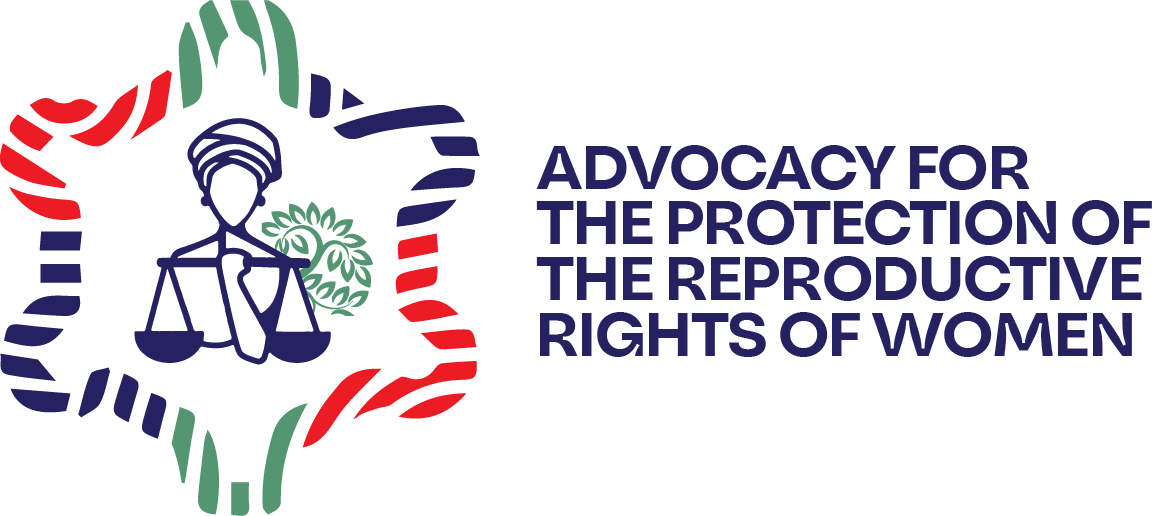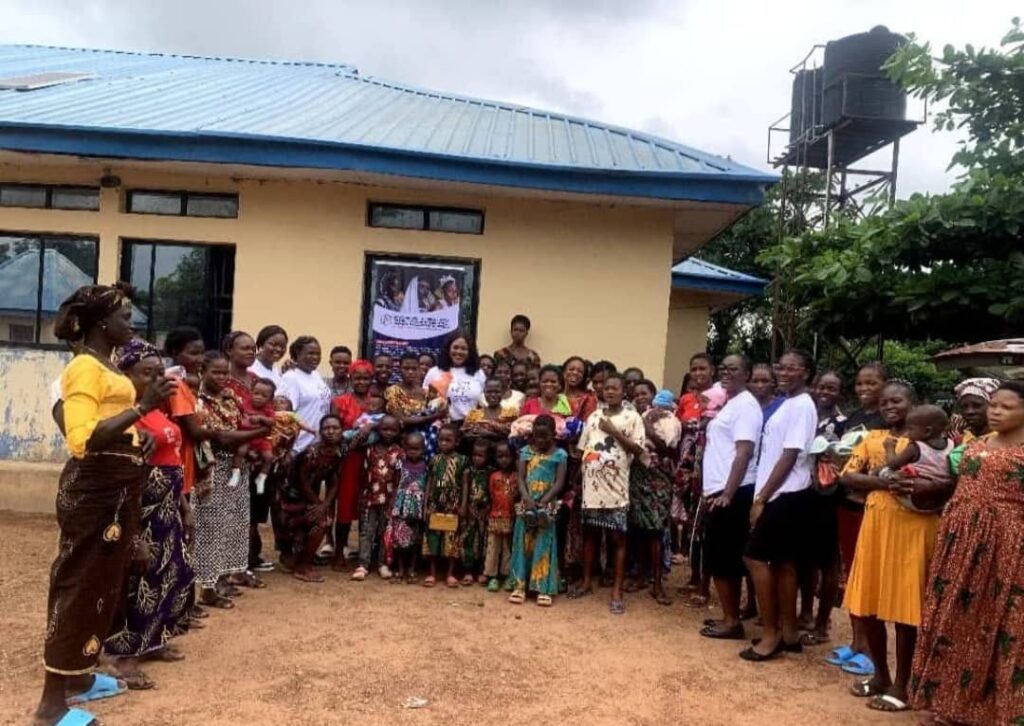On the 13th of August
My team and I conducted an outreach at Okpanku MDGs in Ndiegu Okpoitumo, Abakaliki LGA of Ebonyi State. The journey from Abakaliki Urban was long, underscoring the rural location’s remoteness. Our visit followed an interview with the Officer in Charge (OIC), Mrs. Eucheria Ogodo, as we sought to deepen our understanding of the underlying factors preventing the full realization of reproductive rights for women in rural areas.
Okpanku MDGs is the only government maternal and child health center serving the locality, providing care for all pregnant women in the area. It also doubles as an immunization center for children and adults. Despite our visit coinciding with Nwida market day, which meant many women were busy with their trade, there was still a significant turnout, illustrating the large number of women dependent on this facility.
the recognition she deserves, even on global stages, for her unwavering commitment to rural healthcare.
During our outreach, we emphasized the importance of reproductive rights, child spacing, family planning, and economic empowerment, all framed within the practical realities of their lives. We also highlighted the significance of hygiene and immunization for both maternal and child health. To support healthcare delivery at the center, we donated essential health relief materials.
However, our visit further exposed the severe neglect of rural healthcare in Nigeria:
- Lack of Healthcare Workers: Okpanku MDGs, like many rural health centers, is severely understaffed. With only three healthcare workers tending to the reproductive health needs of over 2,000 women and children, the situation is dire. The infrequent presence of a doctor exacerbates the issue. Rural lives matter too, and policies must be implemented to ensure more healthcare workers are employed in these areas.
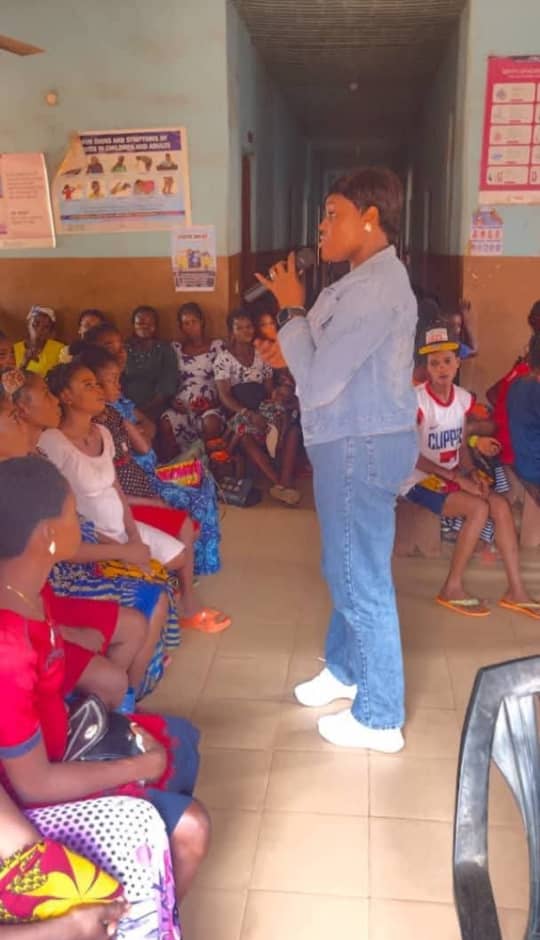
Lack of Electricity: The absence of electricity in the locality severely impacts the health center. This has resulted in inadequate water supply, as the OIC must rent a generator to draw water. Such conditions hinder effective healthcare delivery.
Inadequate Facilities: The facility is in dire need of a refurbished ward. The limited number of beds cannot accommodate the women and children it serves. Out of the seven bedframes available, only two had mattresses. The lack of curtains in the wards further deprives patients of privacy.
Emergency/Referral Response: In emergencies requiring a referral, there are no ambulance services for easy transfer to better-equipped hospitals. Due to the poor access roads to the health center, motorcycles are often used in such situations. While this mode of transport can be uncomfortable for the distressed patient, it remains a necessary option to get the job done.
This write-up aims to explore and expose these real issues with the hope of attracting the necessary interventions to improve rural healthcare, particularly in enhancing the reproductive rights of women in Nigeria’s rural areas.
However, our visit further exposed the severe neglect of rural healthcare in Nigeria:
- Lack of Healthcare Workers: Okpanku MDGs, like many rural health centers, is severely understaffed. With only three healthcare workers tending to the reproductive health needs of over 2,000 women and children, the situation is dire. The infrequent presence of a doctor exacerbates the issue. Rural lives matter too, and policies must be implemented to ensure more healthcare workers are employed in these areas.
- Lack of Electricity: The absence of electricity in the locality severely impacts the health center. This has resulted in inadequate water supply, as the OIC must rent a generator to draw water. Such conditions hinder effective healthcare delivery.
- Inadequate Facilities: The facility is in dire need of a refurbished ward. The limited number of beds cannot accommodate the women and children it serves. Out of the seven bedframes available, only two had mattresses. The lack of curtains in the wards further deprives patients of privacy.
- Emergency/Referral Response: In emergencies requiring a referral, there are no ambulance services for easy transfer to better-equipped hospitals. Due to the poor access roads to the health center, motorcycles are often used in such situations. While this mode of transport can be uncomfortable for the distressed patient, it remains a necessary option to get the job done.
This write-up aims to explore and expose these real issues with the hope of attracting the necessary interventions to improve rural healthcare, particularly in enhancing the reproductive rights of women in Nigeria’s rural areas.
We express our profound appreciation to Mrs. Eucheria Ogodo, one of the unsung heroes who don’t wear capes. Her dedication to improving healthcare is the reason Okpanku MDGs remains functional. May God bless her efforts, and we hope she gets
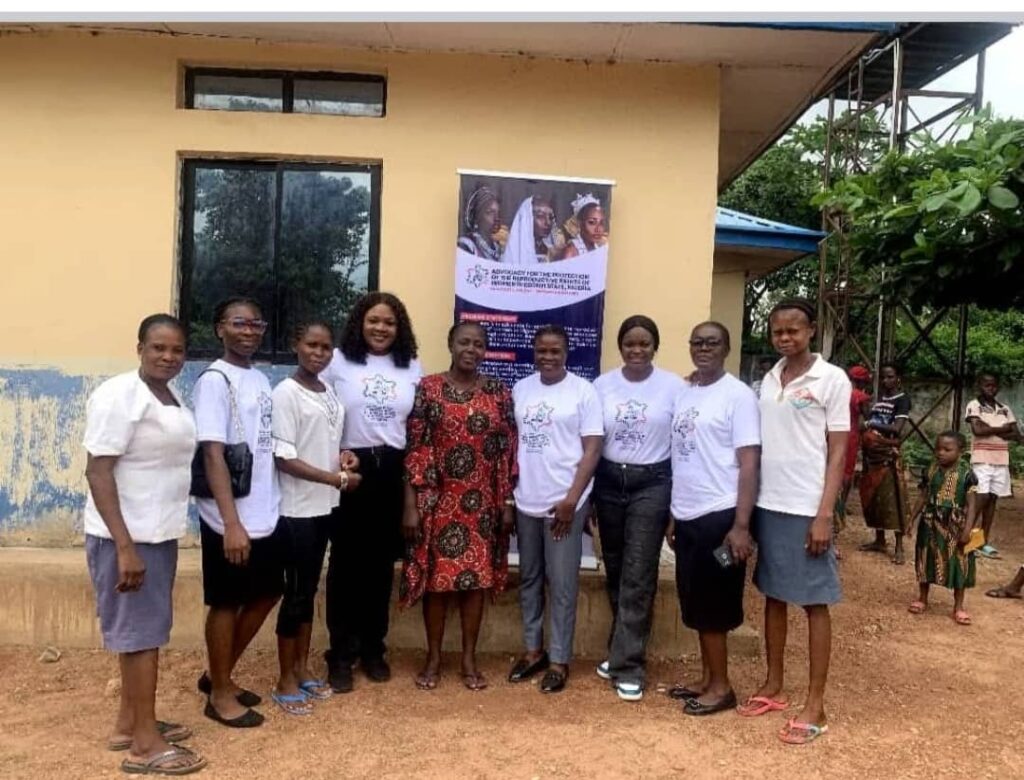
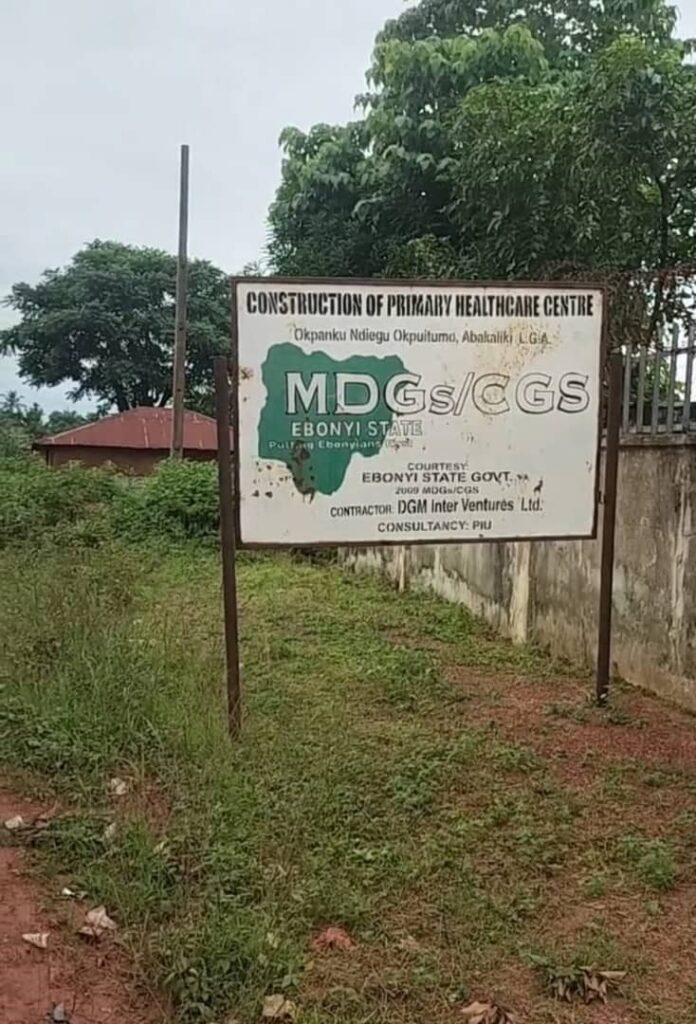
On 7th October 2024
In line with our objective to raise awareness and educate women in rural, underserved areas of Ebonyi, my team and I visited Uwaremu Nwanwu MDGs in Amachi, Izzi LGA. Our visit coincided with an immunisation and antenatal care day, giving us the opportunity to speak with a significant number of breastfeeding and pregnant women present. We shared valuable information on reproductive rights, explaining what constitutes an abuse of these rights. Additionally, we emphasized the importance of family planning, child spacing, and assured them that our team, in collaboration with the State Ministry of Justice, is always available to provide legal support when necessary to defend these rights.
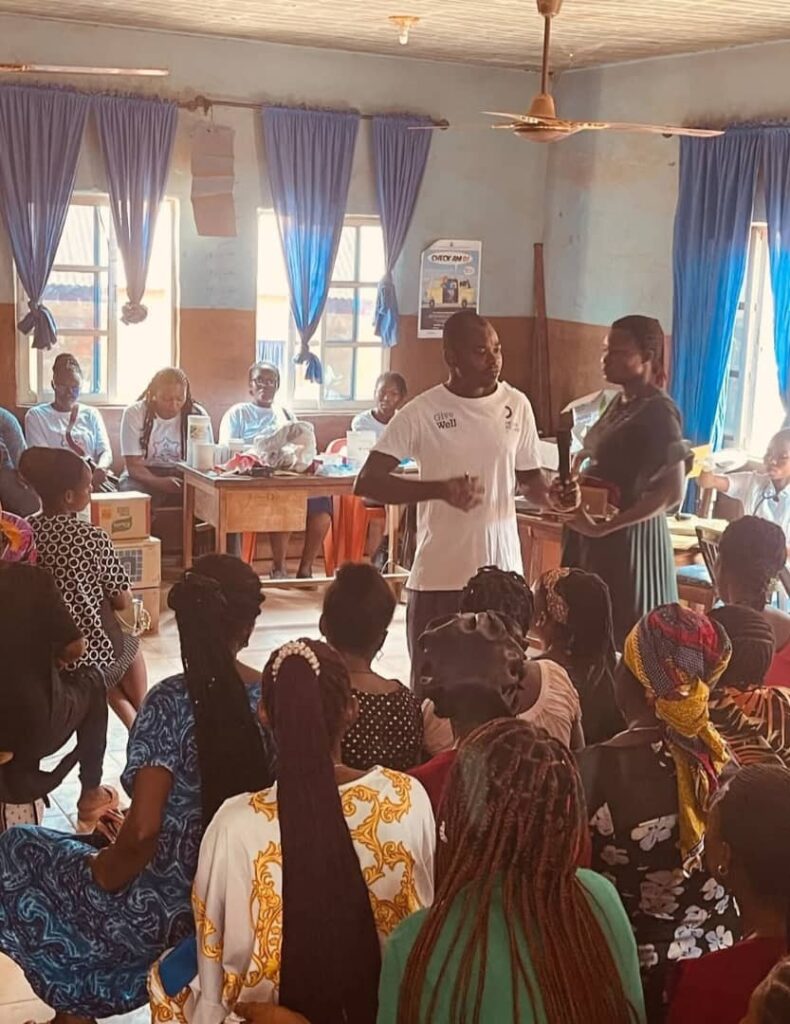
As part of our support, we donated a few medical supplies to the facility, contributing to healthcare delivery in the community.
During our tour of the healthcare facility, my heart sank upon observing the following conditions:
1) The healthcare center lacks its own dedicated building. From the outside, it appears as though the entire structure belongs to the healthcare center. However, it actually occupies just one room in a building that formerly housed the development center. Despite the space available, the healthcare center operates solely from this single room.
2) The center is severely under-equipped. The ward does not have proper bed frames or beds—just a single student bunk bed placed on the floor. After childbirth, a mother rests briefly on this bed before being transferred to a mat, allowing the bed to be used for the next woman in labor. The labor room itself is merely a small demarcated area, with a single table covered in a wrapper serving as the delivery bed.
3) Staffing is a major challenge. There are only two women managing both antenatal and immunization services for the entire community. Alarmingly, no doctor has been to the facility since the beginning of the year. This raises serious concerns about how they handle emergencies.
4) The facility has no access to electricity. As a result, all immunisation and antenatal activities take place outside the building.
I urge the relevant stakeholders to take immediate action to improve the healthcare delivery system in rural areas within the state. By creating a more conducive environment for healthcare, women in these communities will be protected from the exploitation of quack health practitioners. Additionally, this will reduce their reliance on traditional birth attendants, whose practices often lack the necessary hygiene and medical expertise, leading to complications, infections, and preventable deaths.
Reproductive Rights Awareness/Advocacy Outreach at Offiaji, Ndiegu Okpoitumo, Abakaliki LGA, Ebonyi State – February 12, 2024
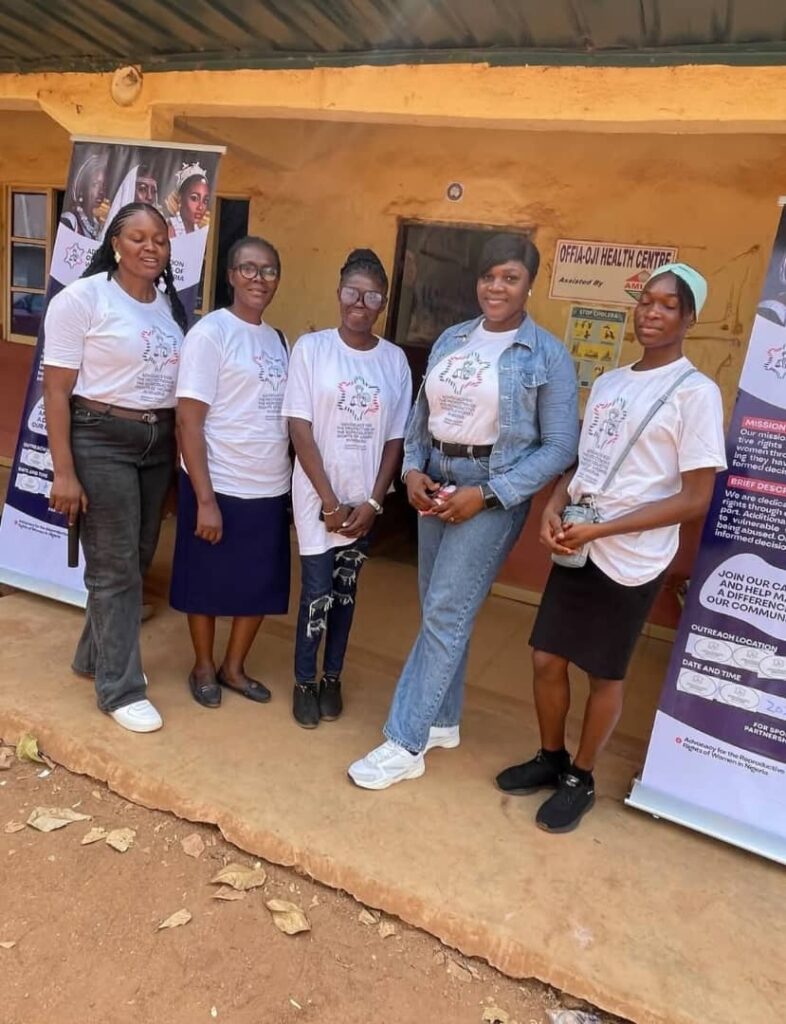
Reproductive Rights Awareness/Advocacy Outreach at Offiaji, Ndiegu Okpoitumo, Abakaliki LGA, Ebonyi State – February 12, 2024
My team and I embarked on a vital Reproductive Rights Awareness and Advocacy Outreach in Offiaji, Ndiegu Okpoitumo, Abakaliki LGA of Ebonyi State. This outreach was deeply impactful, as we engaged with over 120 young pregnant women, shedding light on the fundamental concept of Reproductive Rights, the various forms of violations women face, and most importantly, how they can protect themselves, their daughters, and other women in their community from these abuses.
A key aspect of our discussion was the importance of regular antenatal visits at designated healthcare centres. We strongly cautioned against patronizing traditional birth attendants (TBAs), a practice still deeply rooted in rural communities. While TBAs may be seen as accessible and familiar, we emphasized the severe risks associated with their services such as unsafe delivery conditions, lack of emergency medical care, exposure to infections, increased maternal mortality, and a higher likelihood of neonatal complications. We urged the women to prioritize their health and that of their unborn children by seeking professional medical care in well-equipped facilities.
A Painful Reality: The Prevalence of Female Genital Mutilation (FGM)
One of the most heart-wrenching moments of our engagement came when we delved into the issue of Female Genital Mutilation (FGM). As we explained its lifelong health risks and human rights violations, the pain in the room was palpable. One woman, in particular, shared her harrowing experience of prolonged and excruciating labour with each delivery—a direct consequence of being mutilated as a child. This story was not unique. Alarmingly, our interactions revealed that a staggering 70% of the pregnant women in attendance had undergone FGM.
Despite the deep-rooted nature of this harmful tradition, there was a powerful and reassuring resolve among the women to bring an end to this practice in their community. Witnessing this shift in mindset was a profound moment for us, one that reaffirms that with persistent advocacy, education, and community engagement, change is possible.
We also took the opportunity to demystify the misconceptions surrounding Caesarean Sections (CS). In many rural communities, CS is wrongly stigmatized as a sign of weakness or failure in childbirth. We emphasized that the ultimate goal of childbirth is a safe delivery for both mother and child, not how the baby is born. If a C-section is medically necessary, it should not be viewed with fear or shame but embraced as a life-saving medical intervention.
Giving Back to the Community
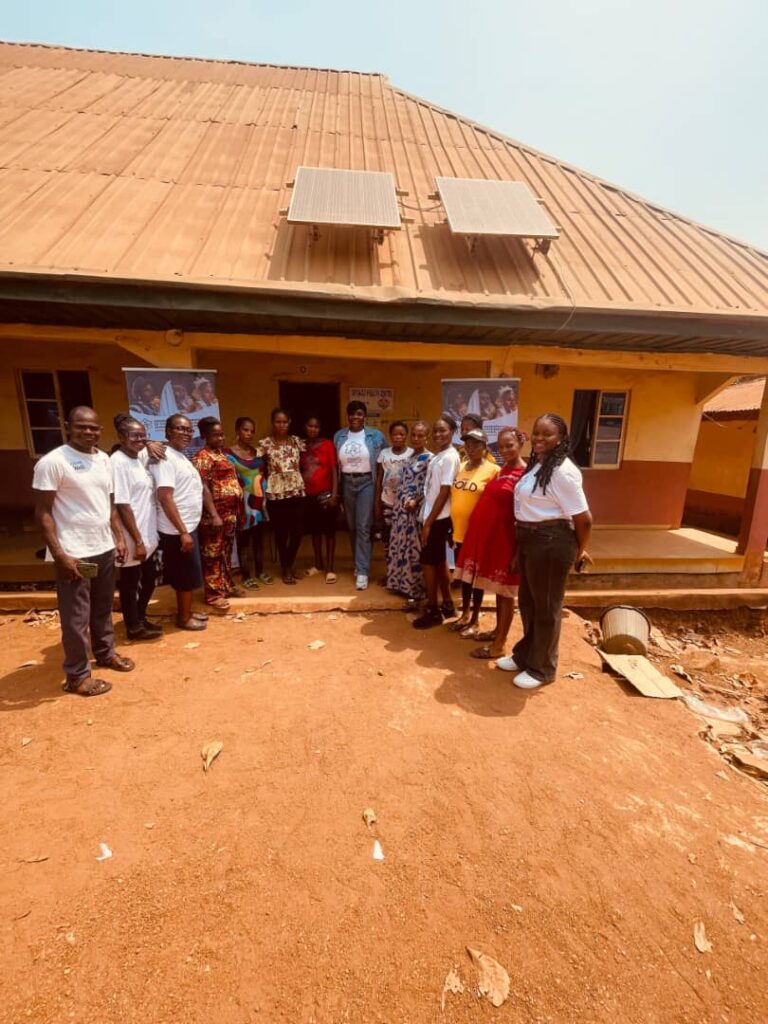
True to our tradition, we didn’t leave empty-handed. We donated essential medical supplies to assist the local healthcare centre in its operations. As a small token of appreciation, we also handed out Knorr Nigeria Maggi wraps to the women—an expression of gratitude for their time, attentiveness, and commitment to learning.
This outreach was more than just an event—it was a powerful dialogue, an opportunity to challenge harmful cultural norms, and a moment to inspire real change. Seeing the women embrace knowledge and commit to safeguarding the reproductive rights of the next generation was truly rewarding. We are hopeful that the conversations sparked during this engagement will pave the way for a healthier, more empowered community of women.
We remain committed to this cause and look forward to reaching more communities with this life-saving advocacy.


